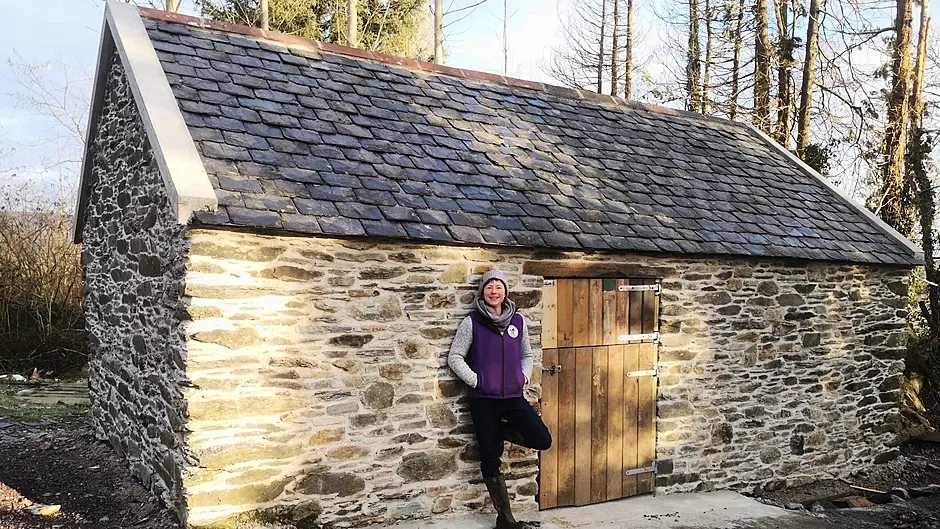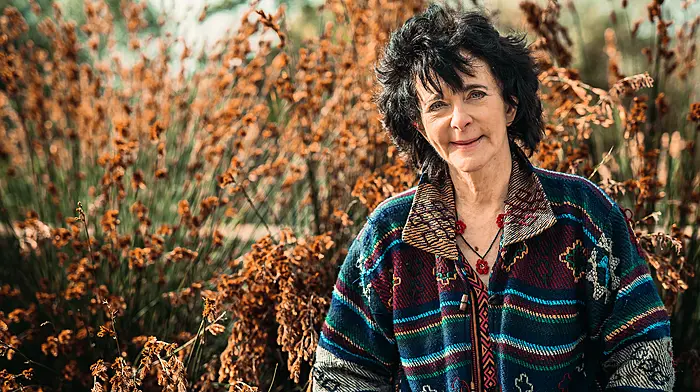A FARM building that dates back to at least the 1850s has been restored to its former glory thanks to the vision and determination of a Bantry-based farmer.
Sandra Schmid is a registered social worker and runs the Hairy Henry Therapeutic Riding Centre in Ballylickey where people can attend for lessons and therapeutic riding.
She marked her 10th year in business last summer, and previously made headlines when, along with her horse Flora, she rode the 500km Beara Breifne Way to raise money to complete a new indoor arena at her centre.
The German woman who has lived in Bantry for 25 years, had qualified for €48,000 Leader funding for the project, and raised almost €30,000 herself, and took on the adventure to get the project completely finished off.
The arena was officially opened in 2022 and has been a huge success. Not surprisingly, intrepid Sandra turned her energy to a new project: the ambitious renovation of a stone farm building on her land.
‘We bought land next to where we live around 12 years ago,’ said Sandra. ‘It’s a few acres and a tiny traditional farmyard with a shed dating to the 1960s, and two stone buildings, one from the 1850s and the other even older.’
From day one, Sandra said she had dreamed of restoring the buildings. ‘It was always a dream of mine to bring them alive so they could be used again,’ she said.
 How the shed looked before the renovation project. Below: the building restored to its former glory. Sandra Schmid said the building was originally used as an animal shelter.
How the shed looked before the renovation project. Below: the building restored to its former glory. Sandra Schmid said the building was originally used as an animal shelter.
When she heard of the Heritage Council’s Traditional Farm Buildings Grant Scheme she felt it was her chance to make that dream a reality, and she applied last spring for funding and was successful.
The scheme is for the conservation and repair of traditional farm buildings and related structures. Its aim is to ensure that traditional farm buildings and other related structures that contribute to the character of the landscape and are of significant heritage value, are conserved for active agricultural use.
To qualify, the applicant must be a registered farmer and part of Acres and the scheme pays up to €30,000 or 75% of the project cost.
‘Our quote was just short of €20,000 and we got roughly 70% of that, paid retrospectively,’ she said.
The results, she said, are quite spectacular, with huge credit going to local craftsmen.

‘Tim Whooley from Bantry was the stone mason doing a super job on the lime and mortar stone wall. Tim O’Shea from Adrigole was the builder who restored the roof skilfully using all the old slates and roof timbers. And Oisin Creagh was the conservation architect who advised us expertly along the way and also traced the stone shed back to the 19th century,’ said Sandra.
The shed now looks exactly as it would have all those decades ago. ‘For example. we weren’t allowed put roof felting in so bats and swallows could get in, and we couldn’t put any extra windows in either. It’s only 13 sq m, it’s tiny, but that’s the whole charm of it.’
The shed would originally have been used as an animal shelter.
‘We haven’t used it yet but the plan would be to us it for storage or stabling – although it looks so wonderful I’m not sure I want to let animals into it!’ she joked.
Sandra urged other farmers, who may not be aware of the scheme, to look into it.
Her ambition is to also renovate the other older building in the yard, which she knows was used as a dwelling. For now, though, the plan is to showcase what she has already achieved, during Heritage Week in August.
‘We’d love to have an open day and invite people here to have a look at what is a piece of local history.’
What is the traditional farm buildings grant scheme?
THE Traditional Farm Buildings Grant Scheme looks to ensure that traditional farm buildings and other related structures that contribute to the character of the landscape and are of significant heritage value, are conserved for active agricultural use.
The scheme is run by the Heritage Council, funded by the Dept of Agriculture, Food and the Marine. In 2023, around 60 projects were given grant support by the Heritage Council. In 2023, grant amounts varied between €4,000 and €30,000, with the Dept of Agriculture, Food and the Marine makes all grant payments on this scheme following certification by the Heritage Council. Grant awards did not exceed 75% of the cost of the works with some grants for less than 75% of the cost of the approved works.
Applications for the 2024 scheme have not yet opened but a spokeswoman for the Heritage Council said a decision was expected imminently from the Dept of Agriculture on 2024 funding.







